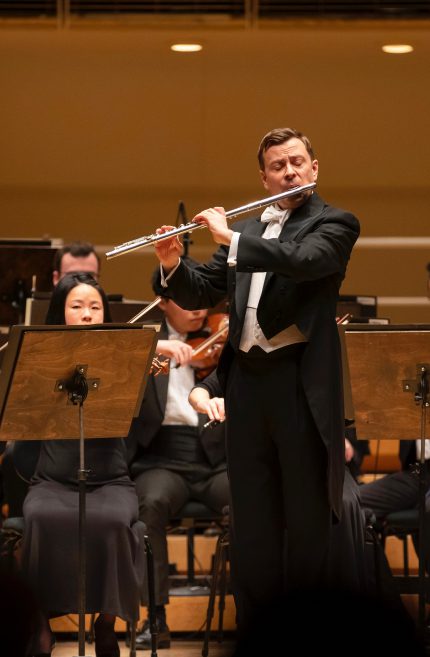Two principals take the solo spotlight in CSO’s all-Mozart program

For this week’s all-Mozart program, the Chicago Symphony Orchestra took a page from the book of the Orpheus Chamber Orchestra and performed essentially without a conductor. Robert Chen, CSO concertmaster since 1999, served as “leader” for the evening, but beyond his subtle direction from the head of the first violin section, musical authority on Thursday night was more collective than concentrated.
This arrangement yielded the best results in the evening’s two concerto outings. Principal flutist Stefán Ragnar Höskuldsson has been making inspired contributions from the wind section since replacing his predecessor Mathieu Dufour in 2015, but Thursday night was his solo debut with the orchestra. While such initial forays from orchestra members can be letdowns as orchestral players are asked to assume a very different role, Höskuldsson’s first solo turn was an unmitigated success.
His vehicle was Mozart’s Flute Concerto No. 2 in D Major, K. 314. The work is an arrangement of the composer’s Oboe Concerto just transposed up a whole-step and with minor filigrees added to the solo part. (The Oboe Concerto vanished a few years after it was penned in 1777, leaving only the D major version for flute extant. It wasn’t until the Oboe Concerto’s manuscript was unearthed in Salzburg in 1920 that the work’s fate became clear: it hadn’t disappeared, but persisted in a different key for a different solo instrument.)
The last time the Flute Concerto No. 2 appeared on a CSO program was in a 1991 performance by then-principal Donald Peck under Georg Solti— the orchestra’s new principal oboist William Welter hadn’t yet been born.
Höskuldsson’s inspired performance brought the work back to the Orchestra Hall stage with style and panache. His playing in the opening Allegro was graceful and fluent, and Höskuldsson’s gleaming tone filled the hall in the introspective Andante ma non troppo. The closing Rondo was fleet at a brisk clip, and each movement was adorned with an inventive, tasteful cadenza.
Chen himself took center stage for Mozart’s Violin Concerto No. 3 in G Major, K. 216 (with Höskuldsson graciously rejoining the ranks of the orchestra to accompany his colleague). Chen’s rendition of the spacious Allegro was nimble and idiomatic, and he eloquently floating the Adagio’s arioso melody of a bed of subtly pulsating strings. The final bars of the magnanimous Rondo were greeted with an affectionate standing ovation from the audience, which felt as much in honor Chen’s decades of stalwart leadership as for his excellent concerto performance.
In both concertos the orchestra responded to their colleagues with the sensibility of seasoned chamber musicians (which they all are), taking the soloists’ leads and allowing them space for flexibility and spontaneity.
Mozart’s Symphony No. 25 in G Minor closed the program. Often called the “Little” G minor symphony in deference to his genre-defining counterpart No. 40, little felt insubstantial in Thursday’s performance. The opening Allegro con brio was propulsive and vigorous, adorned with haunting floating oboe lines from William Welter. The Andante came off as somewhat genteel, and might have benefitted from greater sculpting than Chen provided from the concertmaster chair. The austere Menuetto had a jagged severity, and Welter’s flexible, light tone was particularly well suited to the winds-only Trio. The closing Allegro brought the evening to an emphatic conclusion.
The program began with perhaps Mozart’s most familiar work: the string serenade Eine kleine Nachtmusick. While it was refreshing to hear Mozart’s inventive final serenade somewhere other than being sight-read in the corner of a wedding reception, Thursday’s performance felt perfunctory—more prepared and capably played than at a wedding but nearly as routine.
The program will be repeated 8 p.m. Friday and Saturday and 7:30 p.m. Tuesday. cso.org; 312-294-3000.
Posted in Performances


